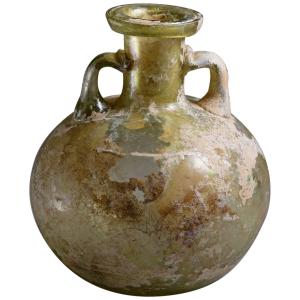
Τόφρα δ’ Ἔρως πολιοῖο δι’ ἠέρος ἷξεν ἄφαντος,
τετρηχώς, οἷόν τε νέαις ἐπὶ φορβάσιν οἶστρος
τέλλεται, ὅν τε μύωπα βοῶν κλείουσι νομῆες.
ὦκα δ’ ὑπὸ φλιὴν προδόμῳ ἔνι τόξα τανύσσας
ἰοδόκης ἀβλῆτα πολύστονον ἐξέλετ’ ἰόν.
ἐκ δ’ ὅγε καρπαλίμοισι λαθὼν ποσὶν οὐδὸν ἄμειψεν
ὀξέα δενδίλλων· αὐτῷ ὑπὸ βαιὸς ἐλυσθεὶς
Αἰσονίδῃ γλυφίδας μέσσῃ ἐνικάτθετο νευρῇ,
ἰθὺς δ’ ἀμφοτέρῃσι διασχόμενος παλάμῃσιν
ἧκ’ ἐπὶ Μηδείῃ· τὴν δ’ ἀμφασίη λάβε θυμόν.
αὐτὸς δ’ ὑψορόφοιο παλιμπετὲς ἐκ μεγάροιο
καγχαλόων ἤϊξε· βέλος δ’ ἐνεδαίετο κούρῃ
νέρθεν ὑπὸ κραδίῃ, φλογὶ εἴκελον· ἀντία δ’ αἰεὶ
βάλλεν ὑπ’ Αἰσονίδην ἀμαρύγματα, καί οἱ ἄηντο
στηθέων ἐκ πυκιναὶ καμάτῳ φρένες, οὐδέ τιν᾽ ἄλλην
μνῆστιν ἔχεν, γλυκερῇ δὲ κατείβετο θυμὸν ἀνίῃ.
ὡς δὲ γυνὴ μαλερῷ περὶ κάρφεα χεύατο δαλῷ
χερνῆτις, τῇπερ ταλασήια ἔργα μέμηλεν,
ὥς κεν ὑπωρόφιον νύκτωρ σέλας ἐντύναιτο,
ἄγχι μάλ’ ἐγρομένη· τὸ δ’ ἀθέσφατον ἐξ ὀλίγοιο
δαλοῦ ἀνεγρόμενον σὺν κάρφεα πάντ’ ἀμαθύνει·
τοῖος ὑπὸ κραδίῃ εἰλυμένος αἴθετο λάθρῃ
οὖλος Ἔρως· ἁπαλὰς δὲ μετετρωπᾶτο παρειὰς
ἐς χλόον, ἄλλοτ᾽ ἔρευθος, ἀκηδείῃσι νόοιο.
(Apollonius of Rhodes, Arg. 3.275-298)
Meantime through the gray fog, Eros, unseen, achieved his goal, and brought such havoc there as gadflies make for heifers as they graze (I mean the creatures that herdsmen call breeze flies). Now standing in the doorway of the porch, he snaps his bowstring taut and from his quiver takes a fresh arrow, anguish-laden. Then unperceived he passes over the sill, then, quick-eyed for hazards, he crouches in front of Jason, centers the notch and flexes the bow between his hands, and shoots Medea. A mute amazement seized and held her spirit, and Eros, with outrageous laughter, fled away from the lofty hall, but the arrow stayed, burned deep in the girl’s body, burned like flames. Again and again on Jason the girl cast glistering glances, and in her breast the heart shuddered incessantly, and she could fix her mind on nothing but the man: her soul by such delicious sickness was distilled. And as a poor woman, spinner of wool, piles brittle twigs upon a redhot brand to coax, against the coming of the night, bright comfort for her shelter, rises early to end this chore before her work begins; so, wreathing round and round Medea’s heart, annihilating Love clandestine blazed, and on her delicate cheeks the color shifted, now paled, now crimsoned, in her reason’s ruin. (tr. W.R. Johnson)




